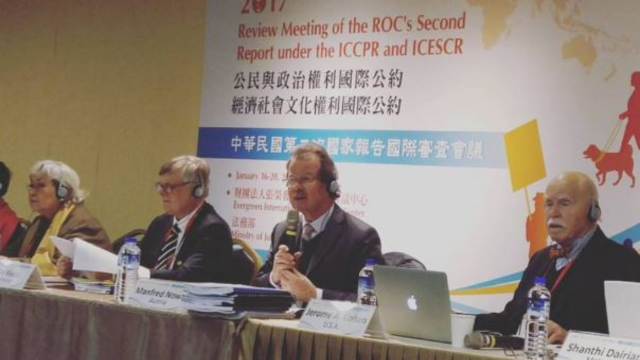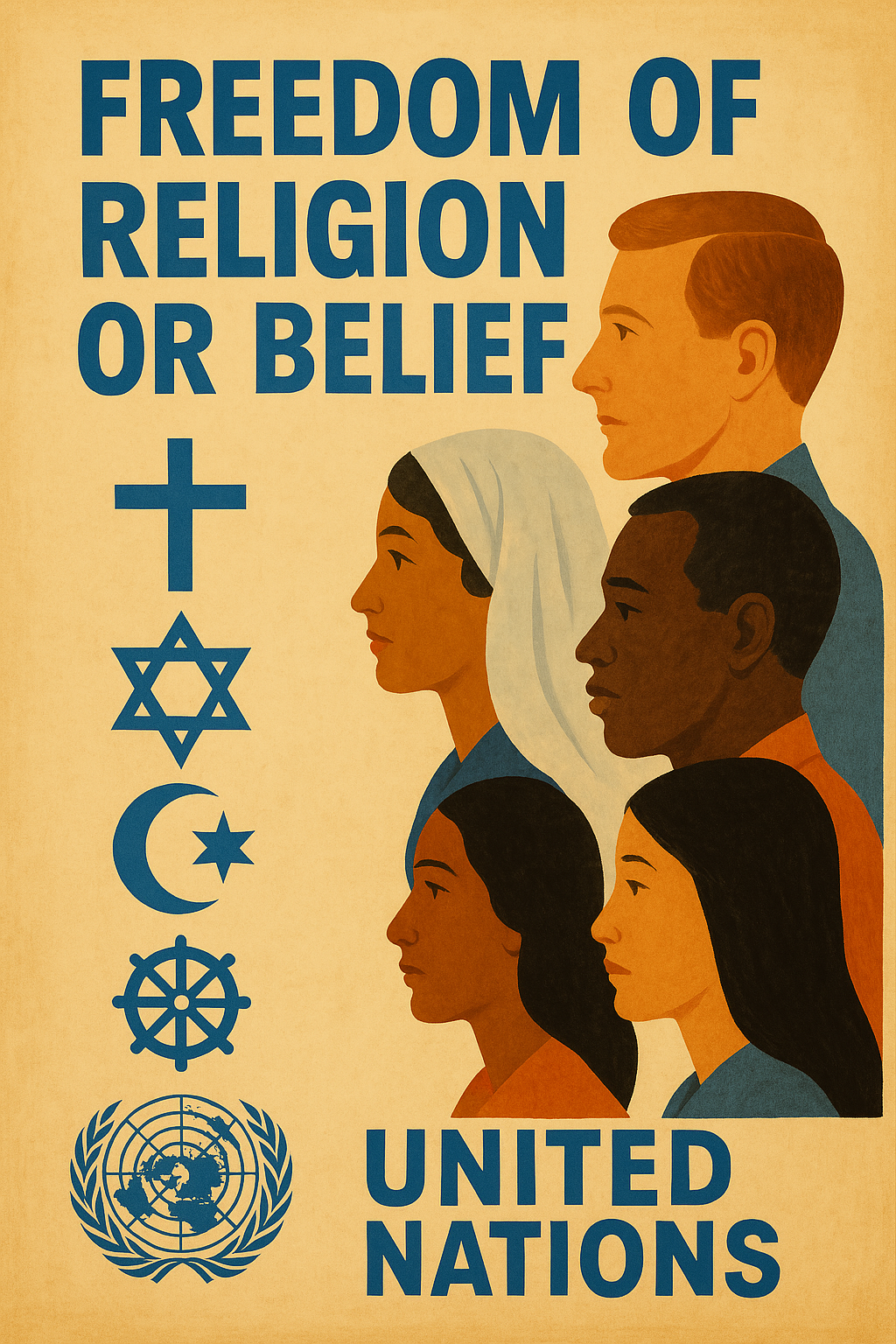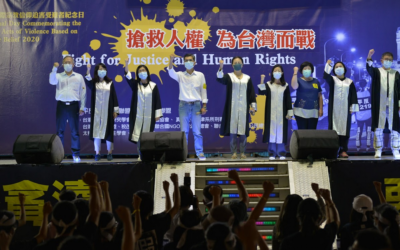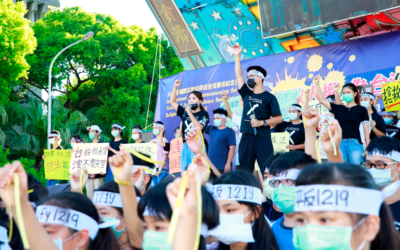Those who drafted the human rights treaties regarded FoRB as essential to their integrity—something Taiwan cannot ignore.
by Rosita Šorytė
*A paper presented at the forum “Silence No More: Taiwan and the World in a Human Rights Relay,” Taipei, July 14, 2025.

Next year, in 2026, the United Nations will solemnly celebrate the 60th anniversary of the signing of the two Human Rights Covenants in 1966 and the 50th anniversary of their entry into force in 1976, upon receiving the required number of ratifications. These covenants are the International Covenant on Civil and Political Rights, known as the First Covenant, and the International Covenant on Economic, Social, and Cultural Rights, referred to as the Second Covenant.
Taiwan is not a member state of the United Nations. However, in 2009, it incorporated the Two Covenants into its domestic law, committing to adhere to them. Since 2013, Taiwan has periodically invited international experts to evaluate its implementation of the Two Covenants. However, the three reviews conducted so far have not explicitly addressed freedom of religion or belief (ForB). Another review is scheduled for next year.
Only the texts of the Covenants as signed and ratified are binding. However, the documents that led to their signature are always significant in interpreting and understanding United Nations treaties. The two Covenants were negotiated over sixteen years, following the path between two General Assembly resolutions. Resolution 421 of 1950 called for drafting binding human rights covenants, while Resolution 2200-A of 1996 adopted the final texts. The United Nations Commission on Human Rights produced numerous drafts and position papers between these two resolutions.

My comments today are primarily based on the work and discussions that culminated in signing the Two Covenants. They underscore the vital importance of freedom of religion or belief (FoRB) within the framework established by these Covenants. A thorough evaluation of a state’s implementation of the Covenants must consider FoRB; otherwise, it cannot be regarded as a complete assessment.
In the architecture of the Covenants crafted by their drafters, freedom of religion or belief (FoRB) is not just one among several human rights; it is a cornerstone of human dignity, autonomy, and a democratic society. FoRB is enshrined in both Covenants and serves as a litmus test for a state’s genuine commitment to human rights. While the Covenants require signatory states to uphold a broad range of rights, FoRB stands out as a right that intersects with all the main civil, political, economic, social, and cultural dimensions of life. A state that adopts these Covenants but fails to respect FoRB cannot credibly claim to honor its human rights obligations.
The First Covenant explicitly safeguards FoRB in Article 18: “Everyone shall have the right to freedom of thought, conscience, and religion. This right includes the freedom to have or adopt a religion or belief of one’s choice and the freedom to manifest that religion or belief through worship, observance, practice, and teaching.”
This article emphasizes that FoRB is not limited to private beliefs but encompasses public expression, community participation, and institutional autonomy. Additionally, it prohibits coercion that would impair individuals’ freedom to adopt or change their religion or belief.
When drafting Article 18, the Committee on Human Rights aimed to establish three legally binding guarantees. First, the article protects against state coercion. Article 18 ensures that individuals are free from being forced into spiritual conformity or suppression by the state. Second, it emphasizes freedom of expression and assembly: the right to religious expression is closely linked to freedom of speech and association, making FoRB essential for other civil liberties. Third, it upholds moral and ethical autonomy: FoRB protects individuals’ right to live according to their conscience, a principle central to democratic governance.
The First Covenant states that any limitations on the expression of religion must be established by law and are only acceptable when necessary to protect public safety, public order, health, or the rights of others. This strict framework helps prevent arbitrary or discriminatory restrictions.

Although the Second Covenant does not have a separate FoRB article, it integrates religious freedom within its broader commitment to non-discrimination and cultural rights.
Article 2(2) prohibits discrimination based on religion in the enjoyment of economic, social, and cultural rights. Article 13 addresses the right to education, affirming parents’ liberty to ensure their children’s religious and moral education aligns with their beliefs. More broadly, religion and spirituality are essential components of the cultural heritage protected by the Second Covenant. Arbitrarily limiting the freedom of religion or belief (FoRB) undermines the right to participate in cultural life.
Those who drafted the Second Covenant acknowledged that economic and social rights are interconnected with civil and political rights. Without freedom of religion and belief (FoRB), individuals may face exclusion from fully participating in society.
FoRB is not merely a stand-alone right; it is intricately linked to other human rights. The denial of religious freedom often indicates broader authoritarian tendencies and is usually associated with violations of freedom of speech, assembly, and due process.
Examples of interdependence include the relationship between freedom of religion or belief (FoRB) and three other fundamental freedoms: (a) freedom of education: parents should have the right to pass on their beliefs to their children without facing social stigma or slander; (b) freedom of association: religious communities need legal recognition and the ability to organize; and (c) freedom of expression: religious discourse is a form of expression that must be protected.
Countries that have signed and ratified the Two Covenants or incorporated them into their domestic laws, as Taiwan has, are legally obligated to uphold their rights. These covenants are not merely aspirational; they establish binding norms.
Examining the Two Covenants in Taiwan, particularly regarding FoRB, should include the Tai Ji Men case. This case is not only a tax matter; it represents a situation where the rights of Tai Ji Men disciples to express their spirituality without harassment or slander freely have been restricted in various ways.

Like any other country, Taiwan should recognize that, beyond legal obligations, a profound ethical imperative exists to uphold FoRB. Religion or belief represents a fundamental aspect of personal identity, and denying this right equates to denying personhood.
In the United Nations human rights framework, freedom of religion or belief is not optional; it is crucial for the integrity of the Two Covenants. This right to believe or not to believe transcends borders, cultures, and ideologies. A state that vows to uphold these Covenants but fails to respect FoRB fully is not simply falling short; it is violating its obligations and undermining the foundational principles of human dignity and freedom.
In a world increasingly characterized by religious diversity and tension, safeguarding FoRB is both a legal and moral obligation. It serves as the foundation upon which all other rights are built. Without it, the structure of human rights crumbles into hypocrisy.

Rosita Šorytė was born on September 2, 1965 in Lithuania. In 1988, she graduated from the University of Vilnius in French Language and Literature. In 1994, she got her diploma in international relations from the Institut International d’Administration Publique in Paris.
In 1992, Rosita Šorytė joined the Ministry of Foreign Affairs of Lithuania. She has been posted to the Permanent Mission of Lithuania to UNESCO (Paris, 1994-1996), to the Permanent Mission of Lithuania to the Council of Europe (Strasbourg, 1996-1998), and was Minister Counselor at the Permanent Mission of Lithuania to the United Nations in 2014-2017, where she had already worked in 2003-2006. In 2011, she worked as the representative of the Lithuanian Chairmanship of the OSCE (Organization for Security and Cooperation in Europe) at the Office for Democratic Institutions and Human Rights (Warsaw). In 2013, she chaired the European Union Working Group on Humanitarian Aid on behalf of the Lithuanian pro tempore presidency of the European Union. As a diplomat, she specialized in disarmament, humanitarian aid and peacekeeping issues, with a special interest in the Middle East and religious persecution and discrimination in the area. She also served in elections observation missions in Bosnia and Herzegovina, Georgia, Belarus, Burundi, and Senegal.
Her personal interests, outside of international relations and humanitarian aid, include spirituality, world religions, and art. She takes a special interest in refugees escaping their countries due to religious persecution and is co-founder and President of ORLIR, the International Observatory of Religious Liberty of Refugees. She is the author, inter alia, of “Religious Persecution, Refugees, and Right of Asylum,” The Journal of CESNUR, 2(1), 2018, 78–99.
Languages (fluent): Lithuanian, English, French, Russian.



